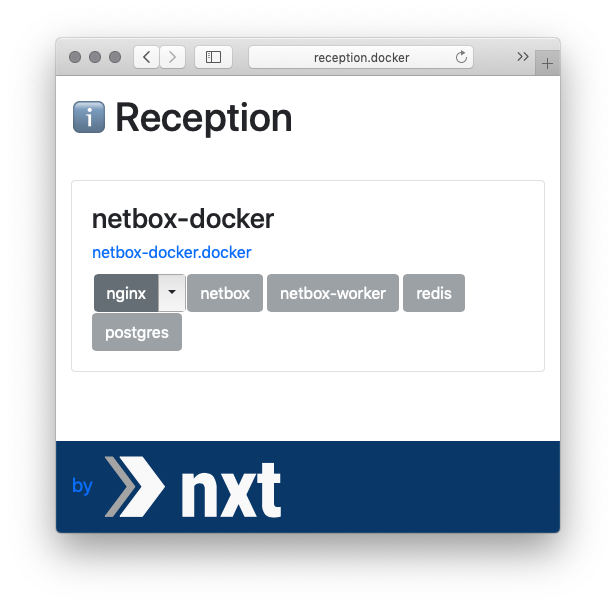A dashboard and reverse proxy for your docker-compose projects. It does not require any dependencies but Docker and docker-compose.
This program shows all docker-compose projects that are running on a handy overview page. It has a built-in reverse-proxy, so that any container's exposed port are accessible as 'container.compose-project.docker'. In order to be able to resolve 'anything.docker' to localhost, this tool also ships a tiny tiny DNS server.
As a result, you'll be able to access your docker-compose projects as 'container.compose-project.docker', and the traffic will automatically be forwarded to the corresponding port, even as you fire up and shut down new docker-compose projects.
You need to have superuser privileges on your computer.
We assume you have Docker and docker-compose already installed.
But for resolving *.docker to localhost (i.e. 127.0.0.1 or ::1), changes to your host configuration are required.
Install reception:
git clone https://github.com/nxt-engineering/reception.git
makeProceed according to your linux configuration:
Instead of .docker as TLD it's the easiest to just use .localhost because that's already built-in in the systemd-resolver.service.
Now run reception:
sudo reception -tld localhostOr install reception as systemd service:
sudo make install
Now try to go to http://reception.localhost.
If you use dnsmasq as your local resolver, add this line to your dnsmasq config:
address=/docker/127.0.0.1
It tells dnsmasq to resolve *.docker with the dnsserver listening at 127.0.0.1:53 (which will be reception).
Then restart dnsmasq:
service dnsmasq restartAnd now run reception:
sudo receptionYou should be able to http://reception.docker now.
Check the content of /etc/hosts.
If it doesn't contain any nameservers pointing to 127.0.0.1, 127.0.0.53 or ::1, then this way of installation should work for you:
sudo -i
mkdir /etc/resolver
echo "nameserver ::1" > /etc/resolver/docker
echo "nameserver 127.0.0.1" >> /etc/resolver/dockerNow run reception:
sudo receptionFinally, try to go to http://reception.docker.
Install reception using homebrew:
brew tap nxt-engineering/reception
brew install nxt-engineering/reception/receptionNext you need to register reception as the resolver for the docker TLD. Run the
following on your command-line
sudo -s
mkdir /etc/resolver
echo "nameserver ::1" > /etc/resolver/docker
echo "nameserver 127.0.0.1" >> /etc/resolver/dockerAt last, start the service:
sudo brew services start nxt-engineering/reception/receptionNow try to go to http://reception.docker.
🤷
reception is customizable to some extend.
See reception -h for a complete list of configuration parameters.
$ ./reception --help
(c) 2017-2018 Nine Internet Solutions AG
(c) 2018-2019 nxt Engineering GmbH
Usage of ./reception:
-dns.address string
Defines on which address and port the HTTP daemon listens. (default "localhost:53")
-docker.endpoint string
How reception talks to Docker. (default "unix:///var/run/docker.sock")
-http.address string
Defines on which address and port the HTTP daemon listens. (default "localhost:80")
-tld string
Defines on which TLD to react for HTTP and DNS requests. Should end with a "." . (default "docker.")
-v Show version.
-version
Show version.
The "main" container defines, where the project address ends up (i.e. http://yourproject.docker):
The container should either have a docker-compose label of reception.main or should be called app:
version: '2'
services:
app: <----- like this
image: nginx
labels:
reception.main: 'true' <--- or like this
ports:
- 80In your docker-compose.yaml file, we advice to not specify a local port and to not export any
unnecessary ports either. docker-compose will bind your exported port to any available local port,
and reception will make sure, that there's a url for it.
This way, you can launch several containers that expose the same port without conflict and therefore avoid port collisions across projects.
Do
version: '2'
services:
app:
image: nginx
depends_on: pgsql
ports:
- 80 <----- like this
pgsql:
image: postgresqlDon't
version: '2'
services:
app:
image: nginx
depends_on: pgsql
ports:
- 80:80 <----- and _not_ like this (local port)
pgsql:
image: postgresql
ports:
- 5432:5432 <----- and _not_ like this (unnecessary port)In order to detect which port of you container "the http port" is, reception looks for the well-known ports
80, 8080 and 3000. You can override this behaviour by setting the label reception.http-port to a port of your choice:
version: '2'
services:
app:
image: special
labels:
reception.http-port: '1234' <--- like this
ports:
- 1234You must run reception as privileged user (i.e. root) for it to be able to bind to port 53 (dns) and port 80 (http).
Most probably you assigned a fixed port mapping for an exposed port. Look for something like the following:
version: 2
services:
app:
ports:
- "8000:80" <---- like thisIn the case above, you would just replace "8000:80" with 80.
First, check if reception is actually running.
Then see if nslookup reception.docker resolves to 127.0.0.1 or ::1 (respectively nslookup reception.localhost on Ubuntu).
If it doesn't, please flush the DNS cache:
# macOS
sudo killall -HUP mDNSResponder
# Linux
systemctl restart named
# or
systemctl restart nscdThis projects requires Go 1.11 or newer.
There is a Makefile with targets for any common task.
Don't just use go build, as it will not bundle the resources!
To build the project, run:
makeTo run a snapshot of the project, run:
make runTo cut a release of the project, adjust the VERSION file and run:
make releaseTo see the commands executed by make, run make as follows:
make <target> VERBOSE=1To run make without having it execute any command, run make as follows:
make -n <target>To cleanup afterwards, run:
make cleanThis program is available as open source under the terms of the MIT License.
This piece of software is currently maintained and funded by nxt.
